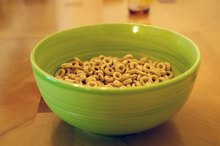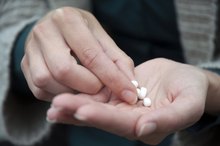Does Niacin Really Clean Your System?
Niacin is one of the B vitamins, specifically the B-3 vitamin. Like other members of the B vitamins, niacin plays a key role in helping your body convert carbohydrates into fuel for energy. While niacin is important in promoting healthy hair, eyes, skin and liver, there is no evidence that niacin cleans your system or removes traces of illegal drugs from your body.
Benefits
Niacin supplements may help reduce the risk of a deficiency of this nutrient. Niacin deficiencies may cause diarrhea, dementia, fatigue, canker sores, depression, scaly skin and vomiting. Niacin may help reduce high cholesterol and help treat diabetes and osteoarthritis, although more research is necessary to confirm these potential benefits. Taking supplements or eating foods high in niacin, such as beef liver, tuna, peanuts, sunflower seeds and beets, may help minimize the risk of a niacin deficiency.
Drug Testing
The Link Between Niacin, Liver Damage & Alcohol
Learn More
Although there is no scientific evidence to support the practice, some individuals take niacin supplements in an attempt to mask drug tests or flush illegal drugs out of the bloodstream. The purpose behind this type of use is to prevent the detection of the main psychoactive ingredient in marijuana, known as tetrahydracannabinol. Although some websites may promote niacin for this purpose, the Centers for Disease Control and Prevention warns there is no evidence that consuming this B vitamin will alter blood or urine tests designed to detect drug use.
Dosage
The recommended dosage amount of niacin for adult males is 16 mg per day, while women require about 14 mg daily. The requirement during pregnancy goes up to 18 mg per day, and 15 mg per day is the recommended amount for breastfeeding mothers. While niacin won’t cleanse you system, you may experience a niacin flush when consuming niacin supplements, a condition common in people who take more than 50 mg of niacin per day.
Precautions
Does Niacin Help With Weight Loss?
Learn More
Niacin supplements are unsuitable for people with stomach ulcers or a history of liver disease. High doses of this vitamin can increase your risk of developing stomach ulcers and liver damage. Niacin may interact with certain medications, including aspirin, anticoagulants, diabetes medications and nicotine patches. Talk to your doctor before taking niacin supplements, especially if you suffer from gout, diabetes or gallbladder disease. Drinking alcohol while taking niacin may lead to drowsiness.
Related Articles
References
Resources
Writer Bio
Laura Wallace Henderson, a professional freelance writer, began writing in 1989. Her articles appear online at Biz Mojo, Walden University and various other websites. She has served as the co-editor for "Kansas Women: Focus on Health." She continues to empower and encourage women everywhere by promoting health, career growth and business management skills.









